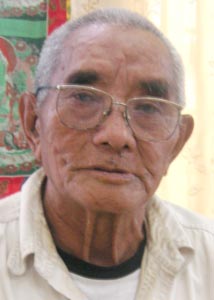Name: Lobsang Khetsun
(Alias: No)
Gender: Male
Interview Age: 82
Date of Birth: 1925
Birthplace: Kongpo Dongna, Utsang, Tibet
Year Left Tibet: 1959
Profession: Monk
Monk/Nun: Previously
Political Prisoner: No

Interview No.: 45
Date: 2007-06-27
Language: Tibetan
Location: Lugsung Samdupling Settlement, Bylakuppe, Karnataka, India
Categories: Resistance and Revolution
Keywords: Dalai Lama -- escape, escape experiences, monastic life, Norbulingka -- defense of, refugee in India -- life as, resistance fighters, Utsang
Summary:
Lobsang Khetsun's parents inducted him into Gaden Monastery as a monk when he was 7 years old. He describes the various monastic organizational structures and daily rituals at the monastery. Gaden Monastery was not initially affected by the Chinese invasion. In 1959, during the Monlam festival, Lobsang Khetsun along with 50 monks each from the Sera, Ganden and Drepung monasteries were requested to volunteer as security guards for His Holiness the Dalai Lama at Norbulingka, His Holiness' summer residence near Lhasa.
The monks relinquished their vows in order to take up guns and changed from their monk's robes into layman's clothing. They were provided with guns by the Tibetan government and were trained to use them.
Lobsang Khetsun tells the complete story of the bombardment by the Chinese army of Norbulingka and Chokpori, atop which stands the Tibetan Medical Centre. After the shelling ended the monks guarding Norbulingka fled and Lobsang Khetsun made his way to the Indian border. In India he joined the Indian Army and fought in Bangladesh.
Interview Team:
- Rebecca Novick (Interviewer)
- Ronny Novick (Videographer)
- Tsering Dorjee (Interpreter)

